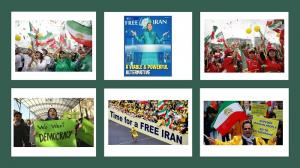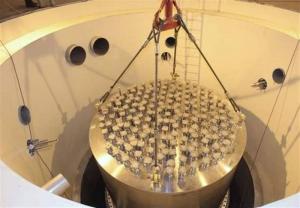(Video) Iran: Past Time for the West to End with the Regime’s Nuclear Extortion
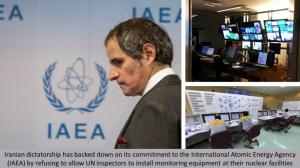
(PMOI / MEK Iran) and (NCRI): despite agreeing to the request 2 weeks ago the Iranian dictatorship has backed down on its commitment to the International Atomic Energy Agency by refusing to allow UN inspectors to install monitoring equipment at their nuclear facilities.
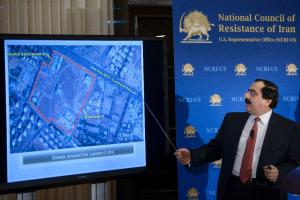
(PMOI / MEK Iran) and (NCRI): The NCRI disclosed details of secret underground nuclear research sites in Iran, known as Lavizan-3, at a press conference at the National Press Building in Washington, DC in February 2015.
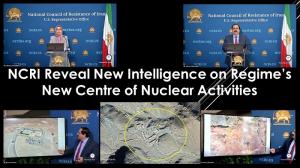
(PMOI / MEK Iran) and (NCRI): NCRI Reveal New Intelligence on Regime’s New Centre of Nuclear Activities. The Iranian people will reject any accord that does not completely shut down the regime’s bomb-making, enrichment, and nuclear facilities.
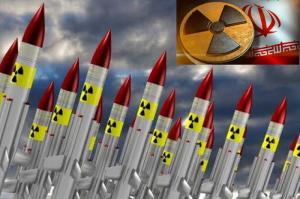
(PMOI / MEK Iran) and (NCRI): The Iran Regime took the final step away from the JCPOA; it will remove limits on centrifuges, uranium enrichment, and nuclear research and development.
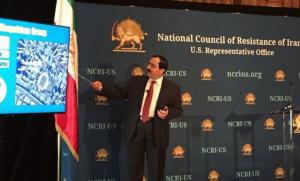
(PMOI / MEK Iran) and (NCRI): Alireza Jafarzadeh during this conference, Jafarzadeh based on first-hand information exposed the continuation of the Iranian regime's nuclear activities despite the nuclear agreement by the IRGC affiliated officials in SPND.
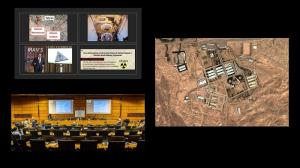
(PMOI / MEK Iran) and (NCRI): reports provided by the People’s Mojahedin Organization of Iran (PMOI / MEK Iran) have made the international community aware of the intentions of the Mullahs regime to build nuclear weapons capability.
Rajavi: Five years after the nuclear deal with the P5 + 1 countries, leave no doubt that this regime has never given up the project to acquire an atomic bomb.
The deal was the latest in a series of stopgap measures to save the Joint Comprehensive Plan of Action (JCPOA) from collapsing completely in each case.
It was only after the fact that it became evident that the agreement was not as effective as claimed, and that Tehran was still taking advantage of the West's excessive concern with safeguarding the JCPOA.
The most recent incidence of non-compliance is the upkeep of data collection equipment at numerous sites that were under IAEA surveillance when the nuclear agreement was in effect.
Earlier in September, the IAEA said that it had achieved a deal with the Iranian regime to allow inspectors access to those facilities so that hard drives could be replaced and normal maintenance could be performed to ensure that the equipment continued to collect data.
However, because that declaration occurred two weeks after the deadline for such normal maintenance, there may be a new permanent vacuum in the international community's understanding of Iran's nuclear activity.
In its most recent quarterly report on Iran's nuclear activities, the IAEA noted that questions about these sites remain unanswered. The traces in question represent unaccounted-for nuclear material that could still be contributing to clandestine and illegitimate military efforts today.
The paper also detailed continuous progress in Iran's openly stated nuclear program. Its results suggest that the Iranian regime has grown its stockpile of 20% enriched uranium by more than 30% since the previous quarterly report and that it has acquired upwards of 10 kg of uranium enriched to 60%, putting it just a few technical steps away from weapons-grade.
Perhaps most damning, the IAEA assessment indicated that a previous deal with Iranian authorities provided significantly less of a barrier against additional breakthroughs than previously supposed.
IAEA Director General Rafael Grossi struck a settlement in February that prevents Iran from expelling international inspectors entirely, as had been planned.
The agreement did not, however, prevent Iran from significantly limiting the IAEA's participation, which turned out to include denying inspectors access to the entire spectrum of monitoring equipment required for their task.
Despite promising to allow maintenance on all of the equipment stated in the previous agreement, the Iranian regime prohibited inspectors from a site in Karaj where nuclear enrichment centrifuge components are manufactured, according to the IAEA.
A surveillance camera at the plant was earlier believed to have been damaged during the period when Iran was supposed to be collecting its own data and had never been replaced, making headlines.
Tehran claims that the destruction was caused by a foreign power's sabotage. It's also possible that Iran was involved in illegal actions aimed at increasing its pace of nuclear enrichment, which resulted in the camera being destroyed in an accident.
In any case, the regime is reportedly refusing to allow the IAEA to replace it, as well as providing an explanation of the occurrence to the agency directly.
Following all of the preceding revelations, this latest development should bring Iran's credibility to an all-time low, causing the JCPOA's Western signatories to rethink their approach to the nuclear issue.
Iran has gradually increased its JCPOA violations and overall aggressive behavior, while the EU has taken no substantive moves in any direction.
It's long past time for the regime to start suffering the consequences for its actions, whether through additional sanctions, increased diplomatic isolation, or increased pressure on its proxies, partners, and supporters.
As the Iranian opposition leader, Mrs. Maryam Rajavi the President-elect of the National Council of Resistance of Iran’s (NCRI), had underlined in 2020, “The policies and actions of the mullahs’ regime, five years after the nuclear deal with the P5 + 1 countries, leave no doubt that this regime has never given up the project to acquire an atomic bomb and continues the deception and concealment. The regime uses all the facilities and concessions that the nuclear deal has given to pursue terrorism, foreign warfare, and domestic repression.”
Thus, the western powers did not achieve their goal of curbing Tehran’s nuclear program. The regime has been able to deceive the international community on many occasions, despite repeated warnings and revelations by the Iranian Resistance and many calls to action by top western lawmakers.
Failing to achieve a nuclear bomb is an existential threat to the mullahs’ regime. The regime obtaining a nuclear bomb would be serious to the world’s peace and security. If the regime achieves its nuclear weapon goal, the western powers should be blamed for their weakness and naivety.
Shahin Gobadi
NCRI
+33 6 51 65 32 31
email us here
Visit us on social media:
Facebook
Twitter
Iran: Fake News or Regime’s New Tactic on its Nuclear Program
Legal Disclaimer:
EIN Presswire provides this news content "as is" without warranty of any kind. We do not accept any responsibility or liability for the accuracy, content, images, videos, licenses, completeness, legality, or reliability of the information contained in this article. If you have any complaints or copyright issues related to this article, kindly contact the author above.

